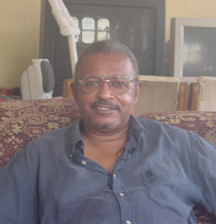In November 2020, Port Of Harlem will celebrate 25 years of publication. As we count down to our birthday, we will republish some of our most popular articles from our print issues. Thanks for subscribing and inviting others to join you in supporting our inclusive, diverse, pan-African publication - - now completely online. We originally published this article in the Aug-Oct 2004 print issue.
Some time had passed between the time I first heard about DNA fingerprinting for tracing ancestral roots and when I completed a story on the issue for my employer, WJLA-TV (ABC) in Washington, D.C. In that report, Howard University’s human genome lab traced my male ancestry back to the Yoruba section of Nigeria. This is the first of two parts that recount my recent trip to the land of my ancestors. WJLA also aired a report on this trip.
Pege, my camerawoman, and I were extremely nervous as we approached customs at Lagos’ Mutala Muhammed Airport. We’d read a book by a British journalist who reported how customs officials had accused him of bringing an old laptop into the country to sell. They threatened to confiscate it unless he paid a $300 import tax. He negotiated them down to $100. We were carrying very expensive television equipment. However, to our pleasant surprise, all the customs people said to us, was, “Welcome to Nigeria.”
Welcome to Nigeria - Part I of II
Travel

After checking into our hotel, we eventually found Lloyd Weaver, whom a friend asked us to contact. Weaver is the great-great grandson of Frederick Douglas. “I always dreamed of living part of my life in Africa,” said the Washington native.
Weaver’s parents raised him in Harlem. He came to Nigeria with Randy Daniels to teach Nigerians how to do television as it’s done in the United States. (Daniels is now New York’s Secretary of State) “A lot of African Americans wear Africa in their hearts and on their head, but they can’t deal with the poverty and inefficiency. Some guys [come here and] go into shell shock!” says Weaver, who owns a television production company.
Though Weaver doesn’t think that Lagos’ crime rate is as high as New York City’s, he recounted being robbed at gunpoint in his office, witnessing his security guard’s murder at his business during a robbery, and being shot at by robbers in his house.
Lagos, Nigeria’s financial capital, is a cosmopolitan city filled with many ethnic groups. “As far as I’m concerned, I’m a part of the mix. We are all African people,” Weaver says.
Read More
Weaver’s parents raised him in Harlem. He came to Nigeria with Randy Daniels to teach Nigerians how to do television as it’s done in the United States. (Daniels is now New York’s Secretary of State) “A lot of African Americans wear Africa in their hearts and on their head, but they can’t deal with the poverty and inefficiency. Some guys [come here and] go into shell shock!” says Weaver, who owns a television production company.
Though Weaver doesn’t think that Lagos’ crime rate is as high as New York City’s, he recounted being robbed at gunpoint in his office, witnessing his security guard’s murder at his business during a robbery, and being shot at by robbers in his house.
Lagos, Nigeria’s financial capital, is a cosmopolitan city filled with many ethnic groups. “As far as I’m concerned, I’m a part of the mix. We are all African people,” Weaver says.
Read More
Advertisers | Contact Us | Events | Links | Media Kit | Our Company | Payments Pier
Press Room | Print Cover Stories Archives | Electronic Issues and Talk Radio Archives | Writer's Guidelines






